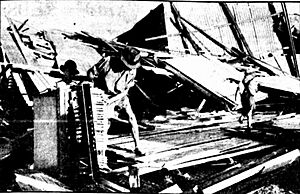Acland, Queensland facts for kids
Quick facts for kids AclandQueensland |
|||||||||||||||
|---|---|---|---|---|---|---|---|---|---|---|---|---|---|---|---|
| Established | 1912 | ||||||||||||||
| Postcode(s) | 4401 | ||||||||||||||
| Area | 38.3 km2 (14.8 sq mi) | ||||||||||||||
| Time zone | AEST (UTC+10:00) | ||||||||||||||
| Location |
|
||||||||||||||
| LGA(s) | Toowoomba Region | ||||||||||||||
| State electorate(s) | Condamine | ||||||||||||||
| Federal Division(s) | Groom | ||||||||||||||
|
|||||||||||||||
Acland is a small rural town in the Toowoomba Region of Queensland, Australia. It is also known as a "locality," which is a specific area or place. In 2021, only 3 people lived in Acland.
The town was first built to support a coal mine. This mine became Queensland's oldest one that worked all the time. Before the mine closed in 1984, about 200 to 400 people lived in Acland.
Later, a new mining company bought almost all the houses in Acland. They planned to knock them down as their open-cut mine grew. By 2009, only one person, Glenn Beutel, still lived there. He did not want to sell his property to the company.
Contents
Where is Acland Located?
Acland is in a region called the Darling Downs. It is north of Oakey. The town is about 160 kilometers (100 miles) west of Brisbane, Queensland's capital city.
The area around Acland has lots of land for farms. People have done dairy farming, raised horses, and, of course, mined coal there. Between 1912 and 1993, Acland received about 690 millimeters (27 inches) of rain each year on average.
A Brief History of Acland
The town of Acland was likely named by Charles Barnard Evans. He was in charge of Railways and his mother's last name was Acland. The area was first called Lagoon Creek.
Early Schools in Acland
Lagoon Creek Provisional School opened in 1885. It became Lagoon Creek State School in 1909. From 1915 to 1920, it was called Acland State School. This school closed in 1930.
A new Acland State School opened in 1921. By 2004, only 12 students attended. It closed for good in 2005.
Mining and Town Life
Acland grew because of coal mining. The Acland Coal Company started mining here. By 1913, the town had a police officer. A post office also opened in 1913.
The Acland number two colliery (a coal mine) opened in 1929. In the 1940s and 1950s, 52 people worked there.
The 1952 Tornado
In December 1952, a strong tornado hit Acland. Most buildings in the town were damaged. The Anglican Church, Presbyterian Church, town hall, and butcher's shop were all destroyed.
A new St Jude's Anglican Church was built. It opened in 1953, replacing the one destroyed by the tornado. This church was later moved to the Jondaryan Woolshed in 2015. It is now used as a wedding chapel.
The Mine's Closure and Reopening
By 1971, Acland had the only coal mine left in the Darling Downs. This mine was Queensland's "oldest and smallest continuously worked coal mine." It closed in 1984. The old mine site is now a special heritage-listed place. It is important because it is "the most intact mine site of its age and type in Queensland."
After the mine closed, it was a mining museum until 2000. Then, in 1999, a company called New Hope Coal started a new open-cut mine nearby. This mine, called New Acland Mine, became a major coal producer.
A Town That Won Awards
In the 1980s, Aclandand won the Queensland Tidy Town Award six times! It was for towns with 200 to 400 people. In 1989, it won the main Tidy Town prize.
The Last Resident of Acland
As the new mine grew, the company bought many houses in Acland. They planned to expand the mine into the town area. In 2006, Acland had only 53 people.
By December 2008, Glenn Beutel was the only homeowner left. He did not want to sell his house to the mining company. In 2010, he was still living there and even took care of the local park. In 2012, a TV show mentioned Glenn Beutel as the last resident of Acland.
Heritage Sites in Acland
Acland has one important heritage-listed site:
- 2 Francis Street: Acland No. 2 Colliery
Schools Near Acland
There are no schools in Acland itself. Students usually go to primary schools in nearby towns. These include Jondaryan, Oakey, Goombungee, and Kulpi. For high school, students go to Oakey State High School in Oakey.
Famous People from Acland
- Alan Jones, a well-known Australian radio broadcaster, went to Acland State School in 1946.
 | Sharif Bey |
 | Hale Woodruff |
 | Richmond Barthé |
 | Purvis Young |



